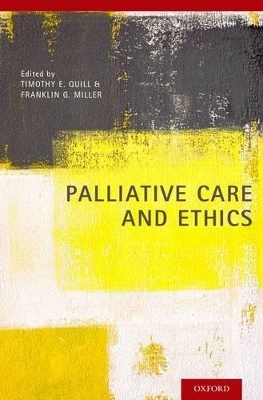
Palliative Care and Ethics
Oxford University Press Inc (Verlag)
978-0-19-931667-0 (ISBN)
Hospice is the premiere end of life program in the United States, but its requirement that patients forgo disease-directed therapies and that they have a prognosis of 6 months or less means that it serves less than half of dying patients and often for very short periods of time. Palliative care offers careful attention to pain and symptom management, added support for patients and families, and assistance with difficult medical decision making alongside any and all desired medical treatments, but it does not include a comprehensive system of care as is provided by hospice. The practice of palliative care and hospice is filled with sometimes overt (requests for hastened death in an environment where such acts are legally prohibited) and other times covert (the delay in palliative care referral because the health care team believes it will undermine disease directed treatment) ethical issues.
The contributors to this volume use a series of case presentations within each chapter to illustrate some of the palliative care and hospice challenges with significant ethical dimensions across the three overarching domains: 1) care delivery systems; 2) addressing the many dimensions of suffering; and 3) difficult decisions near the end of life. The contributors are among the most experienced palliative care, hospice and ethics scholars in North America and Western Europe. Each has been given relatively free reign to address what they feel are the most pressing ethical challenges within their domain, so a wide range of positions and vantage points are represented. As a result, the volume provides a very diverse ethical exploration of this relatively young field that can deepen, stretch, and at times confront any simple notion of the challenges facing patients, their families, professional caregivers, and policy makers.
Timothy E. Quill is a Professor of Medicine, Psychiatry, Medical Humanities and Nursing at the University of Rochester School of Medicine where he directs their Palliative Care Division. He is a board member and the immediate past president of the American Academy of Hospice and Palliative Medicine. He was the lead physician plaintiff on a US Supreme Court Case Quill v Vacco testing the legal permissibility of physician assisted death. Quill is a practicing palliative care physician, the previous author/editor of seven books, multiple peer-reviewed articles in major medical journals, and a regular lecturer and commentator on medical decision making, physician patient relationships, palliative care, and end of life issues. Franklin G. Miller. is a member of the senior faculty in the Department of Bioethics, National Institutes of Health (NIH) and Special Expert, National Institute of Mental Health Intramural Research Program. His principal current research interests are examination of ethical issues in clinical research, death and dying, and the placebo effect. Dr. Miller has co-authored Death, Dying, and Organ Transplantation (with Robert Truog), Oxford University Press (2012), edited five books and written numerous published articles in medical and bioethics journals on the ethics of clinical research, ethical issues concerning death and dying, professional integrity, health policy, pragmatism and bioethics, and the placebo effect.
Section I: Introduction and Overview ; Chapter 1: Introduction (Timothy E. Quill and Franklin G. Miller) ; Chapter 2: Hospice (Charles von Gunten) ; Chapter 3: Palliative Care (Susan D. Block) ; Section II. Ethical Challenges within Current Systems of Care ; Chapter 4: Emerging Complexities in Pediatric Palliative Care (Renee Boss and Nancy Hutton) ; Chapter 5: Patient-Centered Ethos in an Era of Cost Control: Palliative Care and Healthcare Reform (Diane E. Meier and Emily Warner) ; Chapter 6: Palliative Care, Ethics and Interprofessional Teams (Sally A. Norton, Deborah Waldrop, and Robert Gramling) ; Section III. Addressing Dimensions of Suffering ; Chapter 7: Pain Relief and Palliative Care (Nathan Cherny) ; Chapter 8: Management of Dyspnea (Thomas W. LeBlanc, David C. Currow, Jane L. Phillips, and Amy Abernethy) ; Chapter 9: Diagnosis and Treatment of Delirium (Maxine De la Cruz and Eduardo Bruera) ; Chapter 10: Psychosocial and Psychiatric Suffering (Yesne Alici, Kanan Modhwadia, William S. Breitbart) ; Chapter 11: Capacity and Shared Decision-Making in Serious Illness (Ronald M. Epstein and Vikki Entwistle) ; Section IV. Difficult Decisions Near the Very End of Life ; Chapter 12: Withholding and Withdrawing Life-Sustaining Treatments (Robert D. Truog) ; Chapter 13: Medical Futility: Content in the Context of Care (Peggy Determeyer and Howard Brody ) ; Chapter 14: Palliative Sedation (J. Andrew Billings) ; Chapter 15: Voluntarily Stopping Eating and Drinking (Emily Rubin and James L. Bernat) ; Chapter 16: Physician Assisted Death (Timothy E. Quill and Franklin Miller) ; Chapter 17 ; 17a: Lessons from Legalized Physician Assisted Death in Oregon and Washington: (Linda Ganzini) ; 17b: Physician Assisted Death in Western Europe: The Legal and Empirical Situation (Heleen Weyers)
| Verlagsort | New York |
|---|---|
| Sprache | englisch |
| Maße | 236 x 157 mm |
| Gewicht | 544 g |
| Themenwelt | Medizin / Pharmazie ► Medizinische Fachgebiete ► Medizinethik |
| Medizin / Pharmazie ► Medizinische Fachgebiete ► Palliativmedizin | |
| Studium ► Querschnittsbereiche ► Geschichte / Ethik der Medizin | |
| ISBN-10 | 0-19-931667-8 / 0199316678 |
| ISBN-13 | 978-0-19-931667-0 / 9780199316670 |
| Zustand | Neuware |
| Haben Sie eine Frage zum Produkt? |
aus dem Bereich


